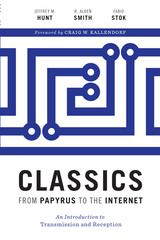
Winner, PROSE Award, Classics, Association of American Publishers (AAP), 2018
Writing down the epic tales of the Trojan War and the wanderings of Odysseus in texts that became the Iliad and the Odyssey was a defining moment in the intellectual history of the West, a moment from which many current conventions and attitudes toward books can be traced. But how did texts originally written on papyrus in perhaps the eighth century BC survive across nearly three millennia, so that today people can read them electronically on a smartphone?
Classics from Papyrus to the Internet provides a fresh, authoritative overview of the transmission and reception of classical texts from antiquity to the present. The authors begin with a discussion of ancient literacy, book production, papyrology, epigraphy, and scholarship, and then examine how classical texts were transmitted from the medieval period through the Renaissance and the Enlightenment to the modern era. They also address the question of reception, looking at how succeeding generations responded to classical texts, preserving some but not others. This sheds light on the origins of numerous scholarly disciplines that continue to shape our understanding of the past, as well as the determined effort required to keep the literary tradition alive. As a resource for students and scholars in fields such as classics, medieval studies, comparative literature, paleography, papyrology, and Egyptology, Classics from Papyrus to the Internet presents and discusses the major reference works and online professional tools for studying literary transmission.

This is the first book-length study on Christians in the ancient Egyptian city of Oxyrhynchus, the site where some of the most important and oldest fragments of early Christian books were unearthed.
Bringing the people in dry papyrus letters and documents back to life, the book reveals how Christians lived in this city in different contexts and situations. In the first part, the image of the city's marketplace functions to address questions of Christian identity in the public sphere. The second part features a man called Sotas, bishop of Oxyrhynchus in the third century, as he is busy networking with other Christian communities, involved in teaching, book production, and fund-raising. The third part, focusing on evidence of the persecution of Christians, reveals the far-reaching power and pervasiveness of Roman bureaucracy. We learn that Christians negotiated their identity through small acts of resistance against the imperial decrees.
The papyrus letters and documents discussed in this book offer sometimes surprising insights into the everyday lives of Christians in the third and early fourth century and nuance our understanding of Christianity in this period. It is the mundane aspects of everyday life that make these papyrus documents so fascinating.

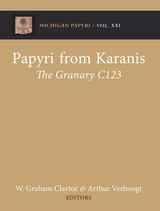
The documents are presented with an introduction, transcription of the original Greek or Latin, translation, commentary, and images. A unique community prayer to the emperor and gods (827) is the volume’s most notable contribution. The other papyri are a mix of private and public documents (petitions, declarations, letters, lists, etc.) that date from between the first century BCE and the fourth century CE. The typological and chronological mix of texts shows that they do not form an undisturbed archive but were rather a dump of wastepaper and other household objects.
Michigan’s excavated papyri are here presented for the first time on the basis of their archaeological find spot rather than being organized according to content. The volume’s introduction provides a possible model for analyzing legacy data from the Karanis excavations stored at the University of Michigan. The book will be of interest to papyrologists, ancient historians, and archaeologists of Greco- Roman Egypt.
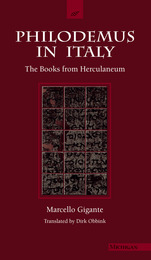

Personal records from the sands of Egypt.
This is the first of two volumes giving a selection of Greek papyri relating to private and public business. They cover a period from before 300 BC to the eighth century AD. Most were found in rubbish heaps or remains of ancient houses or in tombs in Egypt. From such papyri we get much information about administration and social and economic conditions in Egypt, and about native Egyptian, Greek, Roman, and Byzantine law, as well as glimpses of ordinary life.
This volume contains: Agreements, 71 examples; these concern marriage, divorce, adoption, apprenticeship, sales, leases, employment of laborers. Receipts, 10. Wills, 6. Deed of disownment. Personal letters from men and women, young and old, 82. Memoranda, 2. Invitations, 5. Orders for payment, 2. Agenda, 2. Accounts and inventories, 12. Questions of oracles, 3. Christian prayers, 2. A Gnostic charm. Horoscopes, 2.
The three-volume Loeb Classical Library edition of Select Papyri also includes a volume of poetry.

Official records from the sands of Egypt.
This volume presents papyri relating to public business of various kinds in Egypt from the middle of the 3rd century BC to AD 710, thus including affairs in that country first when it was ruled by the Greek Ptolemaic kings, secondly when it was a Roman province. The earliest examples date from the reign of King Ptolemy II Philadelphus and the latest from the government by the Arabs after their conquest of Egypt in AD 639–641.
The papyri chosen were all sent by persons in office (from king, Roman emperor, or governor downwards) or addressed to them or sent for their information: Codes and Regulations, 6 examples. Edicts and Orders, 26. Public Announcements, 6. Reports of Meetings, 3. Official Acts and Inquiries, 5. Judicial Business, 18. Petitions and Applications, 44. Declarations to Officials, 30. Appointments and Nominations, 7. Tenders and Contracts, 19. Receipts, 26. Orders for Payment, 6. Accounts and Registers or Lists, 12. Letters, 16. Notes on the systems of dating and of money in Egypt as well as a glossary of technical terms are provided.
The three-volume Loeb Classical Library edition of Select Papyri also includes a volume of poetry and one of private documents.

Scraps of verse from the sands of Egypt.
The papyri found in Egypt have yielded fragments large and small of ancient literary authors. We include in this volume from the 5th–4th centuries BC fragments of two tragedies (one a satyr play) by Aeschylus; of five by Sophocles; of ten by Euripides; of one by Ion; and of some plays not assignable. From Old Comedy, 5th century, we have fragments of one play each of Epicharmus, Cratinus, Pherecrates, Eupolis, and Plato; some fragments of Aristophanes; and unassignable fragments. From Middle Comedy and New Comedy, 4th and 3rd centuries, are twenty-six items including at least three by Menander and one each by Philemon, Timocles, and Straton. From mimes there are a fragment of Sophron and six unassignable, including 112 lines of clownish doings by the Indian Ocean. The lyric poetry, 7th century BC–4th AD, twenty-one mostly anonymous items, includes some of Sappho, Corinna, Pindar, Philicus, fragments of dithyrambic poetry, hymns, songs and so on. There are seventeen examples of elegiac and iambic, 7th century BC–3rd AD, including some Mimnermus, Amyntas, Leonidas, Antipater of Sidon, and Posidippus. The thirty items of hexameter poetry, 5th century BC–6th AD are mostly unassignable but include Panyasis, Erinna (a lovely fragment of her “Distaff”), Euphorion, Pancrates, and Dionysius (the “Bassarica”).
The three-volume Loeb Classical Library edition of Select Papyri also includes volumes of public and private documents.
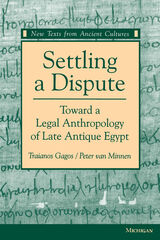
Traianos Gagos and Peter van Minnen offer an English translation and a clear Greek text of the two papyrus fragments, as well as an important discussion of the nature of such mediation, its role in contemporary society, a consideration of the town of Aphrodito and its social and political elite, as well as many other topics that spring from this kind of document.
The use of methodologies from modern jurisprudence and anthropology together with an accessible style of writing mean that Settling a Dispute will be of interest to persons in many fields, including history, Classics, and Near Eastern studies. All Greek is translated, and an extensive commentary offers much helpful information on the text.
Traianos Gagos is Associate Archivist of the University of Michigan's papyri collection. Peter van Minnen is Senior Research Associate in the papyri collection at Duke University.
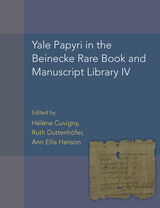
READERS
Browse our collection.
PUBLISHERS
See BiblioVault's publisher services.
STUDENT SERVICES
Files for college accessibility offices.
UChicago Accessibility Resources
home | accessibility | search | about | contact us
BiblioVault ® 2001 - 2024
The University of Chicago Press









